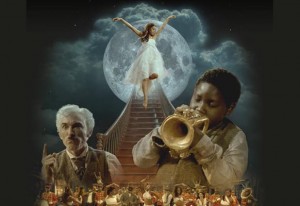Marsalis jazz score a treat in “Louis”
 A faux black-and-white silent film that will gain immeasurably from its road show presentations, “Louis” is more of a novelty than a satisfying cinematic experience.
A faux black-and-white silent film that will gain immeasurably from its road show presentations, “Louis” is more of a novelty than a satisfying cinematic experience.But jazz aficionados certainly will appreciate its evocation of early 20th century New Orleans, and those lucky enough to live in certain cities will have the opportunity to hear its rollicking score performed live by its composer Wynton Marsalis, pianist Cecile Licad and a stellar 10-piece ensemble.
As one might have guessed, the film does feature Louis Armstrong as a central character. Set in 1907 New Orleans, it depicts the legendary musician as a chubby-cheeked 6-year-old wandering the streets of Storyville and coveting an unaffordable cornet hung in a pawn-shop window.
Dan Pritzker’s debut film is no biodrama, however, rather an old-style melodrama that apes (and occasionally updates) many of the cinematic stylistic devices of the silent era, including black-and-white (with hints of color) visuals expertly shot by Oscar-winning cinematographer Vilmos Zsigmond; herky-jerky movement; and intertitles. It’s accompanied by a wall-to-wall score that incorporates original compositions by Marsalis and jazz standards largely from the period.
Unfortunately, less care has been lavished on the screenplay than on the visual and musical trappings, with the result that the proceedings are more confusing than involving. Besides the young Louis, the main characters are beautiful unwed mother Grace (Shanti Lowry), who sings at the local bordello, and the villainous Judge Perry (Jackie Earle Haley), desperate not to let a potential scandal get in the way of his political aspirations.
Despite the brief 70-minute running time, the film feels longer than it actually is because of the episodic story line and the insertion of less than effective conceits like a re-creation of the famous sequence from “Modern Times” in which Charlie Chaplin gets swept into the machinery. Speaking of Chaplin, he’s clearly the inspiration for Haley, who delivers a skillfully accomplished performance that reveals a heretofore unexposed talent for physical comedy.
“Louis,” with Marsalis and the other musicians performing live, will be presented for one-night engagements in several cities through tonight, including Monday night at New York’s historic Apollo Theater. The recorded score that accompanied the film at media screenings demonstrates a clear intention that it will have a life beyond that. And a companion film, “Bolden,” about the famed New Orleans musician, will be released next year.







